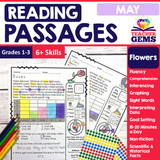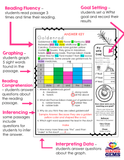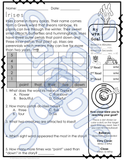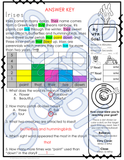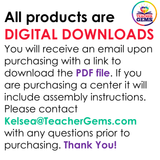May Reading Passages - Flowers
Imagine a simple worksheet with non-fiction reading passages where students practice goal setting, reading fluency, reading comprehension, inferencing, graphing (math) and interpreting data. Now imagine those reading passages including interesting facts and/or scientific facts for students to learn about. What?! That’s right!
*********************************************************************
Click Here to Buy the Bundle and Save!
*********************************************************************
These reading passages are one of a kind because they have a simple, clean format yet are jammed packed with learning! Students practice six skills in one worksheet! Skills include (as mentioned above) goal setting, reading fluency, reading comprehension, inferencing, graphing (math) and interpreting data. These non-fiction reading passages include interesting and scientific or historical facts. The May set has passages all about flowers.
Contents
There are 20 worksheets included along with 20 answer keys. Each reading passage is between 53-66 words long.
- Roses
- Tulips
- Irises
- Sunflowers
- Violets
- Daisies
- Hibiscus
- Magnolia
- Black-Eyed Susan
- Orchids
- Lilacs
- Carnations
- Yucca
- Poppy
- Bluebonnets
- Goldenrod
- Apple Blossoms
- Daffodils
- Peony
- Lily
How to Use
Students begin by setting a words per minute (WPM) goal. Next, they are timed reading the passage three times and calculate their WPM scores (formulas are included to make it easy…teachers can either teach students how to use a calculator or do this part for them. If too difficult or time consuming, simply have the student record the number of seconds it took to read and do not convert them to a WPM score). Then comes the fun part where students get to place dot stickers (or use a crayon to color dots) on the target to show where their score landed (close = within 10 WPM, very close = within 5 WPM, bullseye = reached or exceeded goal).
Once students finish reading the passage three times they graph 5 sight words based on the number of times they were used in the passage. Have students highlight each word in a different color in the passage. Then students read and answer 5 questions about the passage (reading comprehension) and about the graph (interpreting data).
These worksheets would make great morning work activities to get the brain moving first thing in the morning! They are also engaging because they are interdisciplinary, incorporating reading, math and science! Some teachers like to use them for progress monitoring and keep them in a student portfolio to show parents at conferences.
Use them for morning work, homework, literature centers, Response to Intervention (RTI), Daily 5, early finishers, one-on-one tutoring, independent work, partner work (students time each other), or even small group or whole class review (minus the fluency part).
_____________________________________
Grade Levels: 1-3 File Type: PDF (Acrobat) Document File






